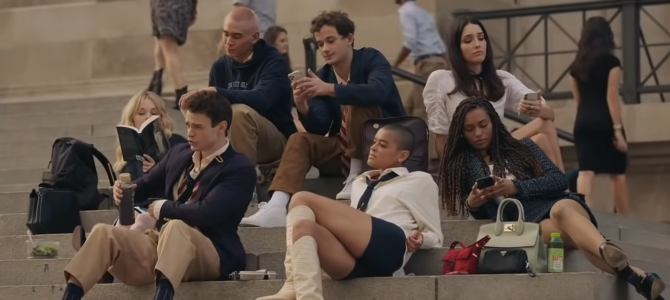
A review of the new “Gossip Girl” in Vanity Fair wants to know “Why Doesn’t the New Gossip Girl Feel Fun?” But what’s amazing about this negative review of HBO’s reboot of the iconic teen drama is that it doesn’t see itself. The writer notes, “The rebooted Gossip Girl refreshingly centers Black voices — but the show stops short of engaging with resulting questions of status and power.”
The reason? Because those “centered black voices” are the voices of power, the black characters are the privileged elite, and it’s just not okay in today’s media climate to critique black power and privilege. While the show “centers black voices,” what it does not do is poke fun at those voices, because it’s simply not allowed.
Instead of being problematically wealthy, the black powerful elite in “Gossip Girl” are assumed to be entitled to their privileges. This shows vividly how much race has replaced class in the revised construct of American socialist ideology.
The new version of “Gossip Girl” replaces vapid white teens and their dramas with very serious black teens and their very serious vapid dramas. Sure, that appears to be much of the point, but it isn’t much fun. Because viewers aren’t supposed to think they are vapid, viewers are supposed to think they are entitled to their privilege.
These new, privileged teens living in New York, attending the top prep school, and posing for Instagram are socially aware. They are rich kids with real feels for the working class. The first day of school sees rich boys bringing breakfast to the “strike line” at the Navy Yard, and the two main characters, half-sisters Julien Calloway (Jordan Alexander) and Zoya Lott (Whitney Peak), are more sympathetic than their counterparts Blair and Serena from the original show.
The author of the Vanity Fair review, Delia Cai, writes: “The breadth of references to real-life Black and afro-indigenous cultural authorities is refreshing; a mainstream show where teens live and breathe Black art as the cultural default feels like a revelation.”
“But,” she continues, “though the new Gossip Girl succeeds in depicting the kind of privilege that takes us from protest to Net-A-Porter all in one day, it stops short of truly engaging with the accompanying concepts of power and elitism. And maybe that’s why it doesn’t feel ‘fun.’”
“It’s beautiful and interesting and a little revolutionary — but watching it is just not the same as laughing at rich white people doing rich white people things,” Cai writes.
The reason, of course, is that you can’t make fun of the new privileged elite’s privileged elitism, because they are “of color.” There can be no “send-up” of rich black girls, and rich black girls can only be serious about their race and identity. They can’t get high with the help, or sleep with their dad’s best friend or whatever. The show is not fun is because it’s not allowed to be.
Part of the problem with the new “Gossip Girl” is that everyone is either oppressed or some kind of savior. The parents who aren’t wallowing in post-divorce drunken self-pity are really good people trying to do the right thing. The teachers are humble servants to the ruling elite who just want to keep their low-paying, private school jobs, and the students — while privileged, rich, bratty, and out for blood — are minorities. They are black, they are LGBT, they are untouchable.
Critics of the show don’t realize this is the problem. Once a group of people is essentially sainted in the public eye and proclaimed to do no wrong, while anyone who disagrees is declared problematic, there can be no fun made. How can Hollywood take aim with poison arrows at privileged minority characters? They can’t; there’s no rubric for it.
Satirists like those who created the first “Gossip Girl” series will have to get over their unwarranted adulation of people based on skin color alone if they want to have any fun. They may not be up to it, but ratings show that audiences are well bored of these woke concerns.
When Vanity Fair calls out a show that intentionally and purposefully “centers black voices” but still lacks in the entertainment department, Hollywood should realize that the real problem is their lack of imagination.









